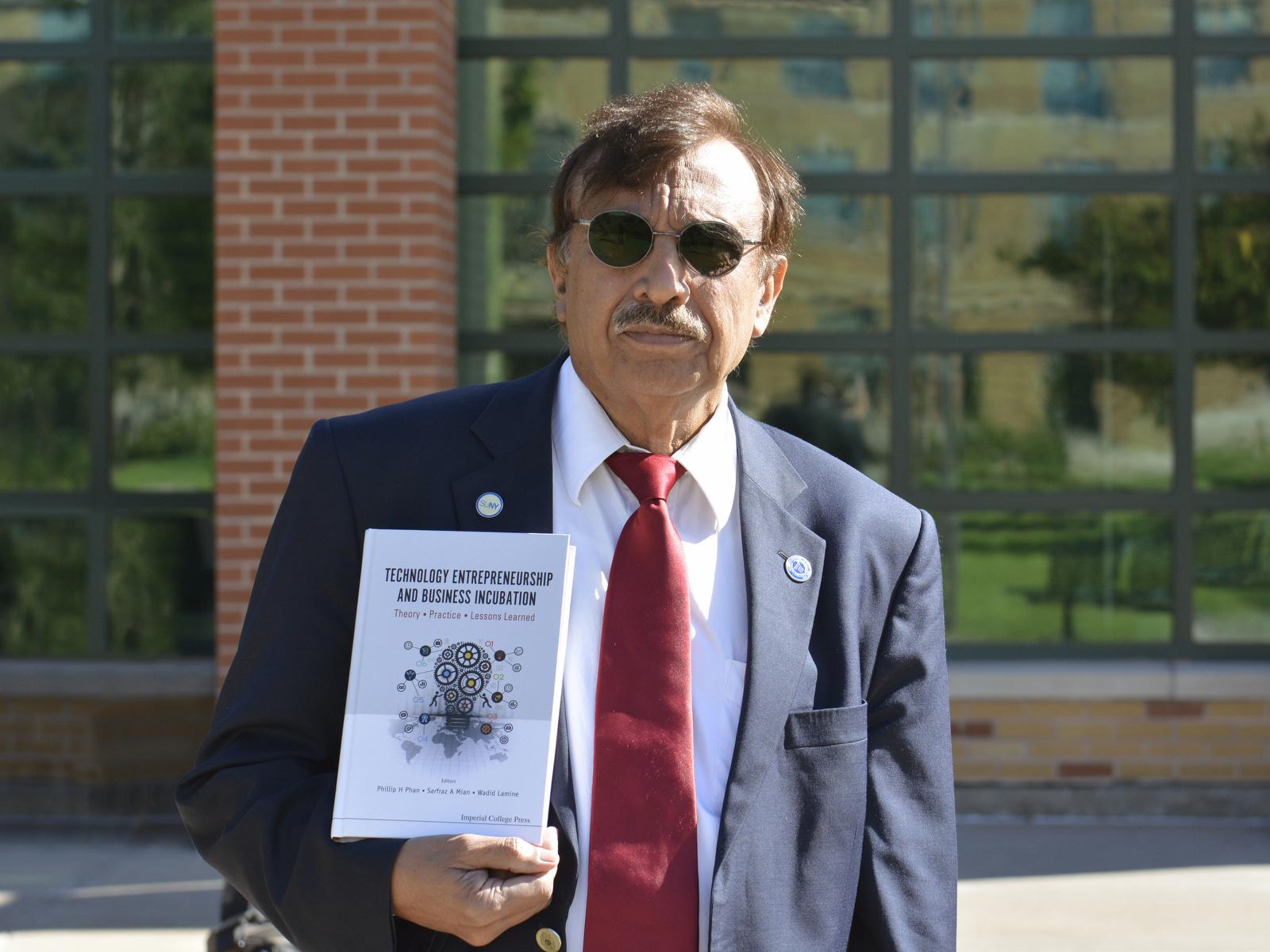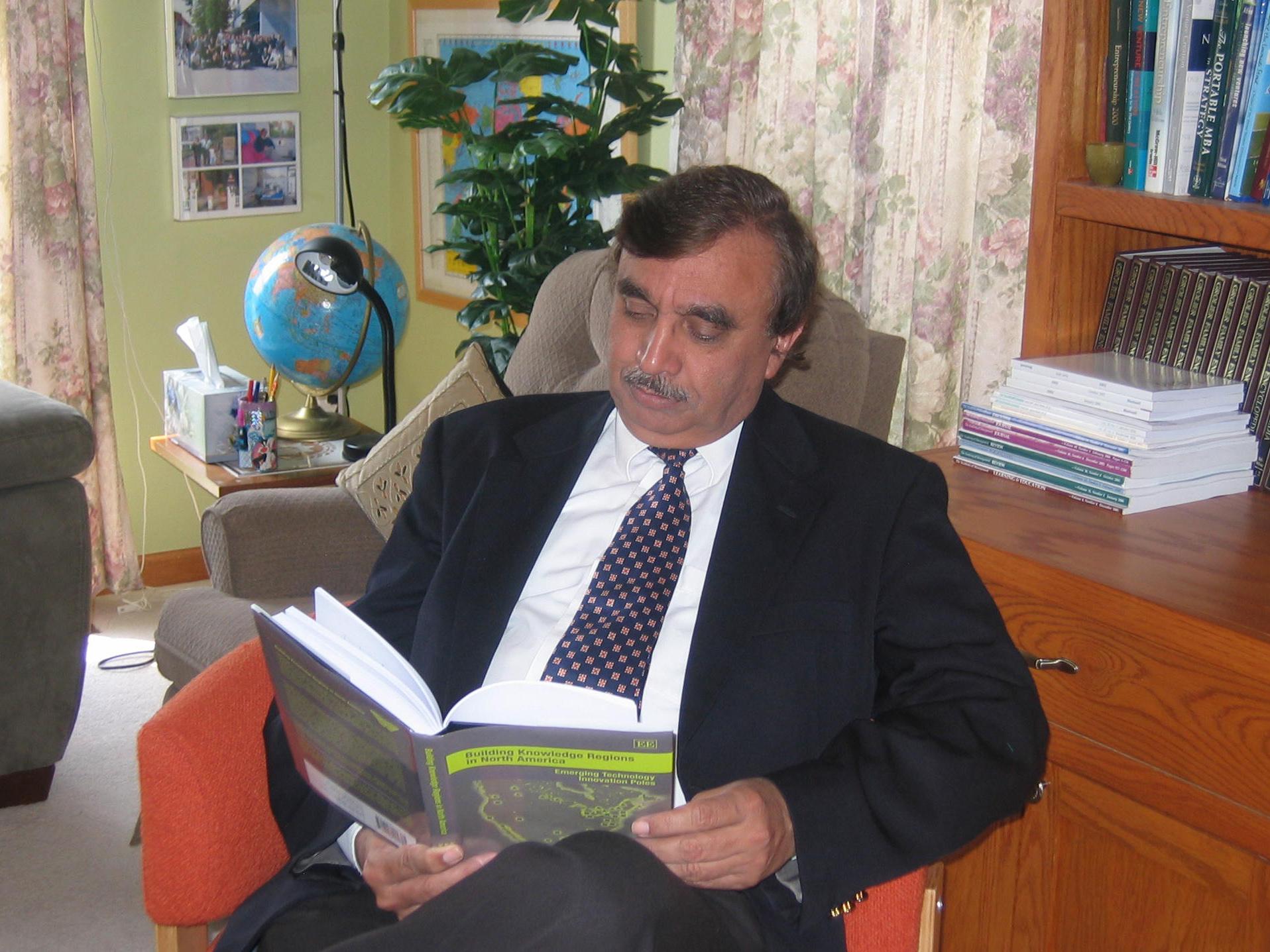Influential researcher -- SUNY Oswego School of Business professor Sarfraz Mian's research on business incubators and accelerators continues to influence the field, most recently evidenced by the Journal of Technology Transfer, which noted he is the most-cited scholar on the topic.
A recent article finding him the most-cited scholar on business incubators and accelerators is the latest example of the impact Sarfraz Mian of SUNY Oswego’s School of Business has had in more than a quarter-century of research in this field.
In the 2018 article “Business incubators and accelerators: a co-citation analysis-based, systematic literature review,” the Journal of Technology Transfer found citations for Mian’s research approaching 300 -- more than 100 ahead of the next most cited -- in hundreds of articles in the highest ranking journals. The study found that Mian also had the two most-cited articles in business incubation core literature.
An earlier literature study in the Journal of Business Research, “A bibliometric analysis of international impact of business incubators,” found 234 citations for the professor of marketing and management (the next highest was 64), for an average of 58.5 citations for each of his articles, well over twice the next-largest per-article citations. The 2015 paper examines 445 studies found on the Web of Science database dating between 1985 and 2015.
Mian said that starting with his Ph.D. dissertation at George Washington University, which he completed in 1992, he has surveyed “all of the major incubation centers in the country … multiple times,” and has kept up his contacts to remain among the world’s foremost authorities in this continuously hot topic of economic development.
Mian receives credit for providing “one of the first frameworks for assessing the practices and performance of incubators. He identifies 13 key characteristics based on a review of incubator studies,” the JTT article notes of his 1994 Technovision publication. Three years later, the journal noted, Mian published an influential categorization in the Journal of Business Venturing on three sets of factors to evaluate effectiveness: “The first set consists of performance outcomes, the second set includes management policies and their effectiveness, and the third set comprises services and their value added.”
Author and organizer
Mian also is author, co-author, editor or co-editor of a number of journal special issues and books on the subject; most recently he co-edited 2016 special issues in Technovision, Journal of Technology Transfer and the collection “Technology Entrepreneurship and Business Incubation: Theory, Practice, Lessons Learned.”
Entrepreneurship and what governments and universities can do to support innovative and entrepreneurial individuals remains ever topical as so many politicians and policymakers continue to see the potential impact of creation of jobs and economic activities, he said.
He served as a driving factor organizing the successful Business Incubator Conference on campus last October. “Business Incubators and New York State: New Strategies for Socio-Economic Revival” drew top practitioners, experts and policymakers to present to an audience that included influential decision-makers on the state and local levels to increase support for incubators and related economic-development tools throughout New York.
The conference “gave Oswego a great name in the field,” Mian said. Attendees provided feedback that it was “interesting, informative, well-organized, beneficial,” among other compliments he received.
In his many activities, Mian credits support from President Deborah F. Stanley and the rest of the college administration for being “supportive in multiple ways and always encouraging.”
Building campus culture
Mian gladly infuses his knowledge into Oswego’s curriculum, setting up and teaching the school’s first “Entrepreneurship” course more than 10 years ago, now available as an undergraduate management course and as an MBA class.
With faculty, administrators and students working together, entrepreneurship as a topic is expanding on campus. The Launch It student start-up competition last fall, with a $1,000 first-place prize, was one of the first and most visible accomplishments enhancing this culture. Mian has established a new “Experiential Entrepreneurship” course to prepare students for the opportunity and plans to design additional courses for engineering, technology and other majors. The School of Business is developing a minor in entrepreneurship, as well.
These activities provide students "state-of-the-art knowledge in terms of business creation activities and how they are actually done,” he explained. “It’s applied knowledge.”
Mian would love to see a campus-supported business incubator to serve students who have ideas and the drive to start their own businesses, and hopes last fall’s conference may help coalesce the partnerships and resources to make it happen.
Oswego has brilliant students in fields such as business, science, engineering and other majors -- as shown by the cross-section of Launch It participants -- who would benefit from an incubator, Mian noted.
For Mian, the future also includes a sabbatical this fall that will include working on yet another potentially influential book on business and technology incubation for the global audience.

Body of work -- Sarfraz Mian shows “Technology Entrepreneurship and Business Incubation: Theory, Practice, Lessons Learned,” a 2016 book he co-edited.




